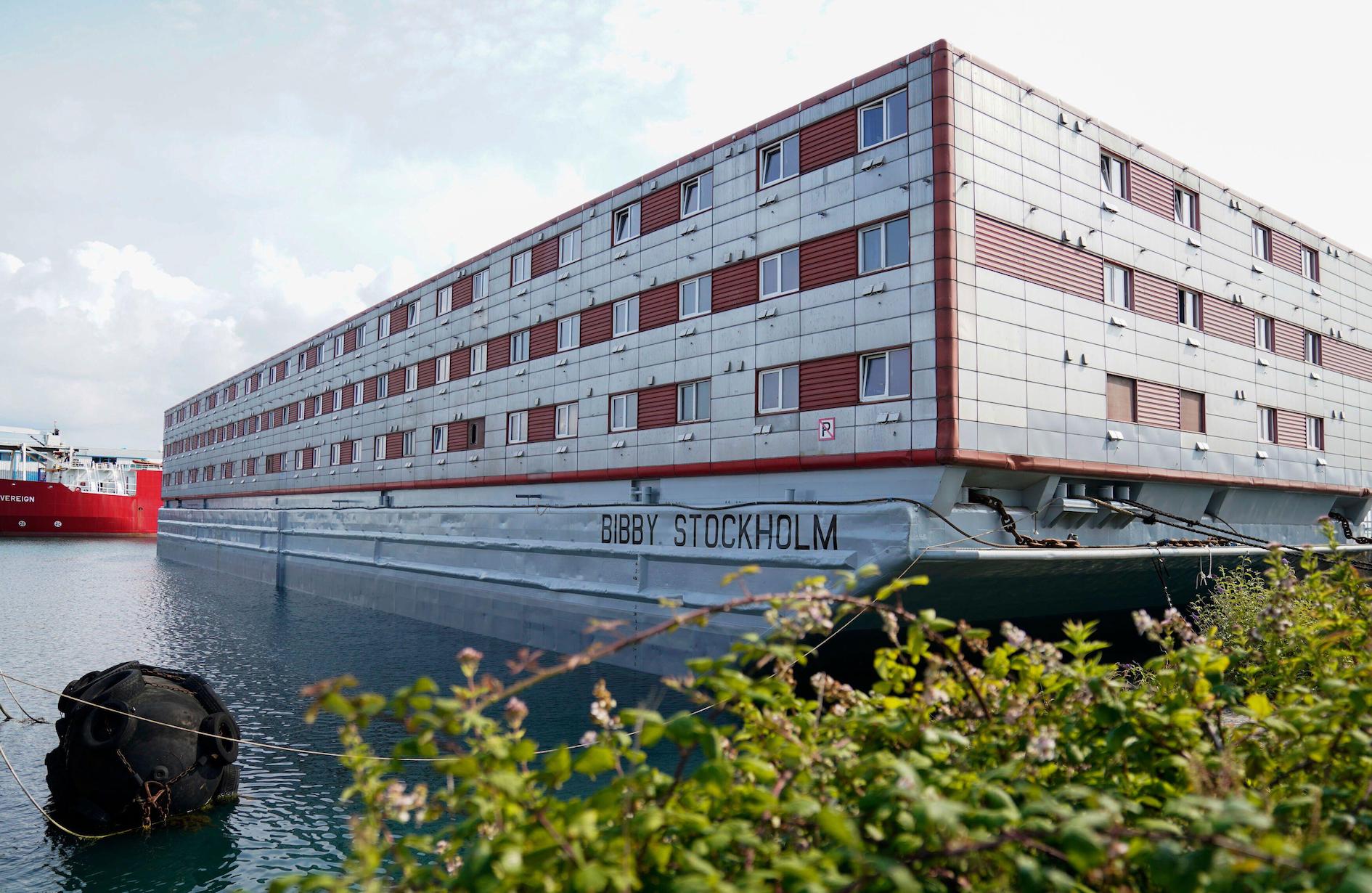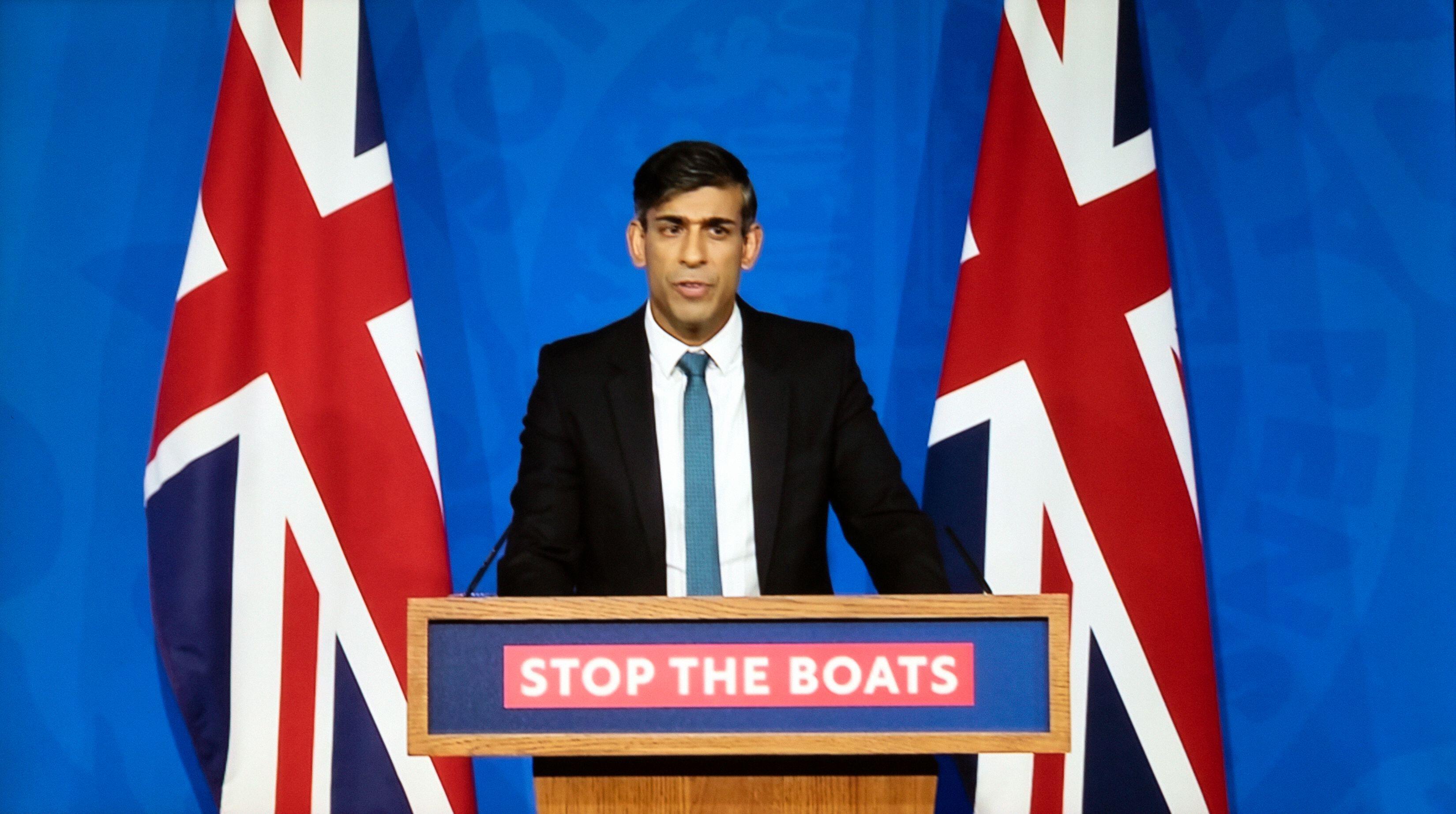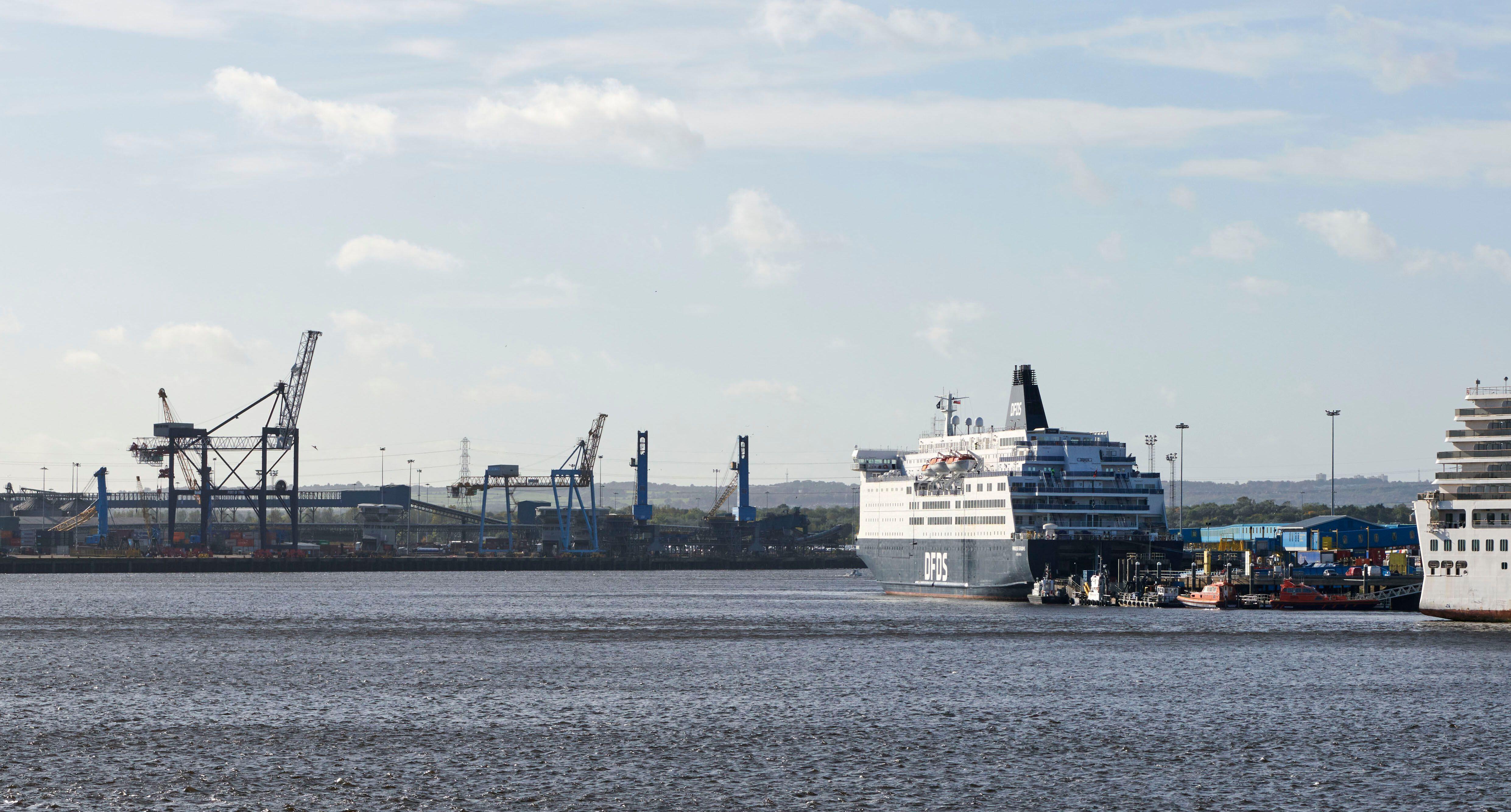Why are MPs being blocked from seeing what's really happening on the Bibby Stockholm?
Six Labour MPs have been trying for months to get on board the Bibby Stockholm to check the disturbing reports smuggled out by residents. They are being repeatedly denied.
A group of Labour MPs are being repeatedly denied permission by the Home Office to board the Bibby Stockholm barge in Portland, Dorset and assess living conditions on the vessel. The barge, the Home Office’s putative solution for reducing the number of asylum seekers in hotels, first began housing asylum seekers in August 2023, has been the scene of complaints, concern, and a dangerous disease outbreak since being launched in August 2023. One of the forced residents, 27-year-old Leonard Farukku, died by suspected suicide in December 2023.
The news prompted the decision by six Labour MPs - Clive Lewis, Nadia Whittome, Lloyd Russell-Moyle, Kim Johnson, Olivia Blake and Paul Sweeney - to come and inspect the living conditions on the barge for themselves. “Initially, the Inspector to the Home Affairs Committee had said MPs are always welcome to come and see the barge,” Lloyd Russell-Moyle, Labour MP for Brighton, tells The Lead. “A group of us thought we’d like to see what was happening.”
Ahead of asylum seekers’ return to the barge - two months after their evacuation due to a legionella outbreak - the group wrote a joint letter in October to then-Secretary of State Suella Braverman requesting access to the barge.
“We are concerned that conditions on the boat will continue to be or grow to be inadequate and potentially dangerous without full transparency and scrutiny,” the letter stated. “We are also concerned that the barge is in effect or will become a place of quasi-detention rather than safe accommodation.”
Having not received an immediate answer, Russell-Moyle decided to travel to Portland at the end of October to meet with asylum seekers from the barge and with Portland residents.
One of Russell-Moyle’s own constituents had just been sent to stay on the Bibby Stockholm, but then was returned to Brighton after a “mental health breakdown on the barge.”
“I wanted to see what the problems were for myself,” he says.
During his visit to Portland, around a dozen people came off the barge to speak to Russell-Moyle about their living conditions.
He was told how gym equipment and balls for the basketball court had been taken away as they could ostensibly be used as weapons. He also said he heard there were only three computers on the barge for the hundreds of forced residents to use.
“Clearly what happened was that things that had been there for the press shoot had been taken away,” he says.
He was also told that no one except residents of the barge were allowed onboard, even if residents extended an invitation. Nor was it easy for residents to leave.
“They can only physically leave [the barge] on the hourly shuttle,” he says. “You can’t walk off the barge.”
“They want to carefully manage the perception of the living conditions on the barge, and with few people allowed on apart from the asylum seekers and those that work there.”
As the numbers of people on the barge increase, Russell-Moyle thinks this arrangement will become a “logistical problem” as hundreds of people try to use one 20-person bus each hour.
When local community members tried to give barge residents food parcels, they weren’t allowed to bring the food on the barge.
“They were told often by the people on the barge – don’t speak to the local community or integrate,” he recounts.
The combination of factors worries Russell-Moyle.
“You’ve got 500 men [and could eventually be women too] twiddling their fingers not doing anything,” he says. “It’s a recipe for disaster - for people wasting away and their mental health deteriorating. You wouldn’t even do that with prisoners.”
About a month after the original letter, an official from the Asylum Support, Resettlement, and Accommodation Team at the Home Office wrote back in November: “We appreciate your concerns, however, there is substantial independent and statutory oversight of the barge, and there are already established processes for Parliamentary oversight. We suggest that you operate through those existing Parliamentary channels, as we will not be offering tours of the barge to individual MPs, MSPs or AMs.”
One of those involved in “Parliamentary oversight” of the Bibby Stockholm is Richard Drax, Conservative MP for South Dorset. He told The Lead he has “been on the barge several times” and “found the barge was being run efficiently.”
He said he knew nothing about a group of Labour MPs trying to access the barge.
Days after the Home Office response was sent to the group of MPs in November, Farruku killed himself on the Bibby Stockholm, instigating a second letter requesting access from the same MPs – this time sent to newly appointed Secretary of State James Cleverly.
“We have grave concerns that conditions on the barge may have contributed to this death, and we must call again for full transparency and access to all places of asylum seeker accommodation for members of parliament, press, and legal and social support groups,” the letter, written on 14 December read.
Having not received a response regarding their second letter, Nadia Whittome, Labour MP for Nottingham East, who had signed both letters requesting access made her own way to the barge for a visit in early January.
When she arrived in Portland, she didn’t try to get on the barge as she had already been formally denied access by the Home Office, and spent her time asking the residents of the Bibby Stockholm who had come off the barge what the living conditions were like.
“The residents told me they felt like living in a prison,” Whittome tells The Lead. “They’re treated with suspicion, subject to searches on the way into the boat and on the way out. There is nothing to keep them occupied on the barge. The TVs in their rooms have been disconnected. Instead, there are three TV rooms for over 300 people.”
She said those on the barge described callous treatment by those working on the Bibby Stockholm - “From staff losing their possessions, to their personal information being left on display, and being lied to.”
Residents showed her pictures on their phones of insects in their food.
“And although the government claims there is 24-hour medical access, the residents said that wasn’t the case,” she says.
One of the biggest issues raised by those she spoke to was the length of time taking to process their claims.
“They desperately want to know the outcome of their claims and to be able to work,” she says. “It was heartbreaking to hear how much hope they had when they first arrived and believed that they would be able to rebuild their lives in safety, and how that’s been crushed through their experience of the asylum system. The toll all this has been taking on them is clear. One resident broke down in tears.”
“The barge represents a policy failure to deal with the huge numbers in the asylum backlog, the cost of housing them, and the impact of our asylum system on vulnerable people’s lives.”
Whittome thinks the government is “trying to avoid scrutiny” by not allowing MPs onboard the barge.
“They want to carefully manage the perception of the living conditions on the barge, and with few people allowed on apart from the asylum seekers and those that work there, they think they can get away with presenting conditions as better than they are,” she says. “The people living on the barge are scared of the repercussions of speaking out about their experience publicly, which makes it even more important for MPs and others to share their testimony.”
Russell-Moyle suspects that by ignoring MPs requests for access to the barge, the government hopes they will eventually lose interest.
“If they ignore you long enough, you’ll give up – it’s a known tactic,” he says. “Our job as MPs is to not fall for that tactic.”
Clive Lewis was one of the other Labour MPs who had signed the letter, and has been vocal on social media about how he was refused access on the Bibby Stockholm.
“The barge has become a byword for secrecy, incompetence and this government’s cruelty,” he said on Twitter.
He argued that the Home Office’s treatment of asylum seekers applies to all of us - that there is “never an excuse to treat human beings like this.”
“Human rights are either universal or they are lost completely,” Lewis told The Lead. “With the suicide rate among asylum seekers having doubled in the past four years, something is clearly very wrong with the way we are treating people. The Bibby Stockholm barge is a symbol of that failure.”
Although Lewis said it wouldn’t be difficult to have an asylum system that treats people decently, the government has “dragged its heels as regards letting a delegation assess whether even basic conditions are being met.”
Russell-Moyle, Whittome, and Lewis haven’t backed down yet, and they don’t plan to.
“The plan will be to do something else on this,” Russell-Moyle says. “Whether it’s another visit to Portland or whether there is some other intervention that can be made.”
The aim of their prodding, according to Whittome, is to ensure “that the spotlight remains on the Bibby Stockholm and that the government is held to account for the way they are treating vulnerable people.”
But it’s bigger than just the Bibby Stockholm, according to Russell-Moyle. The barge represents a policy failure to deal with the huge numbers in the asylum backlog, the cost of housing them, and the impact of our asylum system on vulnerable people’s lives.
“We urge you to grant us permission to visit the barge to meet with residents and assess the conditions they are living in,” the latest letter to the Secretary of State concluded.
Others in Parliament have also been pushing to see first-hand what the conditions on the barge are like, hoping to ensure the Home Office is held accountable for their treatment of asylum seekers.
Soon after Whittome’s January visit, the Home Affairs Committee visited the Bibby Stockholm as part of their inquiry into Migration and Asylum. In a subsequent letter to the Home Office, Dame Diana Johnson, one of those who visited the barge as part of the Committee, said she was “disheartened” to see some of the living conditions on the barge, and that the crowded conditions “could amount to human rights violations.”
She went on to outline the Committee’s concerns about limited access to religious services, “discrepancies” between accounts of officials and asylum seekers themselves, and physical and mental health support for those on board.
“We hope our reflections will be considered when the Home Office considers the future of the Bibby Stockholm, and any similar vessels it may consider for the purpose of housing asylum seekers,” Johnson concluded.
In a response sent on March 1st, the Home Office confirmed that “a mental health practitioner is now on site for barge residents to access alongside the routine GP service.” However, they added that they do not provide data on those using this service, nor discuss individual cases.
In February, the UNHCR told The Lead that “colleagues” have visited the Bibby Stockholm to report to the Home Office, who have facilitated the visit.
“UNHCR continues to urge the UK government to focus on long-term solutions to the complex issue,” says Maeve Patterson, Senior External Relations Officer at UNHCR. “Accommodation of asylum-seekers on vessels or barges should only be used when absolutely necessary, and only as a temporary, time-limited measure.”
The Home Office has been contacted about the claims in this piece, we are yet to receive a response.
The Lead is now on Substack.
Become a Member, and get our most groundbreaking content first. Become a Founder, and join the newsroom’s internal conversation - meet the writers, the editors and more.





